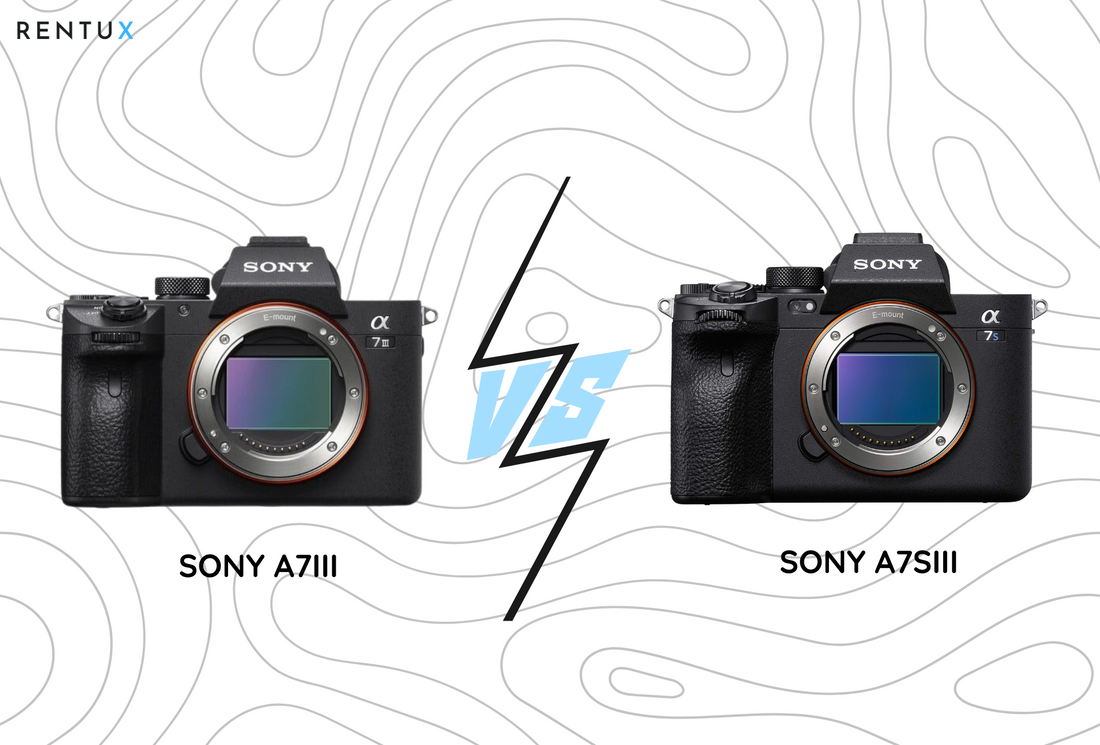
Sony A7III vs. Sony A7SIII: In-Depth Comparison for Photographers and Videographers
Share
When choosing a full-frame mirrorless camera, Sony’s A7III and A7SIII frequently top the list for both photographers and videographers. While both models share a similar design philosophy and robust feature set, they cater to different priorities. Below is a detailed comparison that breaks down their specifications, performance, and unique advantages.
Comparison Table
| Feature | Sony A7III | Sony A7SIII |
|---|---|---|
| Sensor Resolution | 24.2 MP | 12.1 MP |
| Sensor Type | Full-Frame Exmor R CMOS | Full-Frame Exmor R CMOS |
| ISO Range | 100–51200 (expandable to 50–204800) | 80–102400 (expandable to 40–409600) |
| Image Processing | BIONZ X | BIONZ XR |
| Autofocus Points | 693 phase-detect, 425 contrast-detect | 759 phase-detect, enhanced algorithms |
| Video Resolution | 4K up to 30fps, 1080p up to 120fps | 4K up to 120fps, 1080p up to 240fps |
| Bit Depth & Color Sampling | 8-bit/10-bit (via external recorder) | 10-bit 4:2:2 internally |
| In-Body Stabilization | 5-axis image stabilization | 5-axis image stabilization |
| Viewfinder | 2.36M-dot OLED EVF | 9.44M-dot OLED EVF |
| LCD Screen | 3-inch tilting touchscreen | 3-inch vari-angle touchscreen |
| Dual Card Slots | Yes (UHS-II compatible) | Yes (CFexpress Type A/SDXC compatible) |
| Battery Life (CIPA) | Approximately 710 shots | Approximately 660 shots |
| Build & Ergonomics | Robust, weather-sealed | Enhanced ergonomics, improved heat management |
| Price (Approx.) | $2000 (body only) | $3500 (body only) |
Data based on manufacturer specifications and reviews from trusted sources such as DPReview, Imaging Resource, and Sony’s official announcements.
Detailed Comparison
1. Sensor and Image Quality
Sony A7III:
The A7III offers a 24.2 MP sensor that strikes a balance between resolution and low-light performance. This model is ideal for photographers who require ample detail for large prints and cropping flexibility while handling challenging lighting conditions gracefully. Its dynamic range and color reproduction have made it a favorite among professionals in portrait, landscape, and event photography.
Sony A7SIII:
With a 12.1 MP sensor, the A7SIII is optimized for low-light performance and video. Its lower resolution means larger pixels that excel in gathering light, resulting in superior noise performance in dim environments. This sensor is particularly beneficial for videographers and cinematographers who demand high ISO capabilities and extensive dynamic range for professional video production.
2. Autofocus and Performance
Both cameras feature advanced autofocus systems with hundreds of phase-detect points. However, the A7SIII benefits from refined algorithms and additional AF points, resulting in faster subject tracking and improved performance in challenging conditions such as low light or fast-moving subjects. This enhancement is significant for dynamic shooting environments.
3. Video Capabilities
Sony A7III:
The A7III supports 4K recording up to 30fps with excellent detail and image quality, making it a solid option for hybrid shooters balancing stills and video. External recording options allow for 10-bit output, though this is not available internally.
Sony A7SIII:
Targeted primarily at video professionals, the A7SIII offers 4K recording up to 120fps and full internal 10-bit 4:2:2 color sampling. This capability enables smoother slow-motion footage and richer color grading, essential for cinematic production. Advanced image processing (BIONZ XR) and improved heat management further support extended shooting sessions without compromising quality.
4. Ergonomics, Viewfinder, and Handling
Sony A7III:
The A7III’s robust build and weather-sealed design make it dependable in various shooting conditions. Its tilting touchscreen and a 2.36M-dot OLED EVF provide a clear, intuitive interface for most shooting scenarios. Excellent battery performance (approximately 710 shots per charge) enhances its overall versatility.
Sony A7SIII:
The A7SIII refines ergonomics with a vari-angle touchscreen, a significantly higher resolution 9.44M-dot OLED EVF, and a more intuitive menu system. These enhancements, along with improved heat management, allow for better handling during long shooting sessions, particularly in video-centric workflows.
5. Price and Value Proposition
The A7III is priced around $2000 (body only), offering an excellent value for hybrid shooters who need versatility for both stills and video. The A7SIII, at approximately $3500, is a premium investment tailored for dedicated videographers and filmmakers who require advanced video features and exceptional low-light performance. The price difference reflects the specialized capabilities of the A7SIII.
Conclusion
Both the Sony A7III and A7SIII have their unique strengths. The A7III is an ideal, versatile option for photographers and hybrid shooters requiring high resolution and balanced performance, while the A7SIII is a powerhouse for videography, especially in low-light and high-speed scenarios. Your choice between these models should align with your primary needs—whether it's detailed still imagery or advanced video functionality.
Rentux: Your Trusted Camera Rental Partner
For professionals and enthusiasts looking to experience the best of both worlds without committing to a full purchase, renting is an excellent option. Rentux offers a diverse range of camera equipment, including the Sony A7III and A7SIII, along with a host of accessories to support every shooting style. With flexible rental terms, competitive pricing, and dedicated customer support, Rentux empowers you to test and utilize these cutting-edge cameras on your projects with ease. Elevate your creative workflow and ensure you always have the right tool for the job by choosing Rentux as your go-to rental partner.
This in-depth comparison highlights the distinct advantages of the Sony A7III and A7SIII, helping you make an informed decision that aligns with your creative goals. Whether you’re leaning toward high-resolution photography or advanced videography, Rentux is here to provide you with the equipment that elevates your work.
